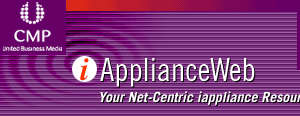 |

    

|
 |
Windows CE. NET Opens Doors to Wireless Development
By Susan Hospod
iApplianceWeb
(01/14/02, 12:46:22 PM EDT)
In his keynote address at the 2002 International CES in Las Vegas, Bill Gates, chairman and chief software architect of Microsoft Corp., announced the launch of Microsoft Windows CE .NET, the robust, real-time embedded operating system for rapidly building the next generation of small-footprint smart devices such as handhelds, smart phones, set-top boxes, retail point-of-sale devices, and displays.
In addition, Microsoft announced new promotional pricing of $995 for the Windows CE .NET tools, as well as free availability of Evaluation and Emulation editions of the tools and platform, and source access to additional Windows CE .NET components. The company also detailed the new Windows CE .NET training curriculum. All of these will help bring developers up to speed quickly on the Windows CE .NET platform and tools, jump-starting their development process.
Windows CE .NET delivers a robust, high-performance platform for developers building smart mobile devices, while allowing them to optimize their operating system footprint to as low as approximately 200K. To enable developers to build the richest mobile devices, Windows CE .NET provides support for the latest wireless technology such as Bluetooth and 802.11 and delivers a complete multimedia and Web browsing experience with Microsoft Internet Explorer 5.5, Windows Media 8 and DirectX 8 technologies. Windows CE .NET allows developers to select the optimal hardware architecture for their projects by supporting a broad range of processor families, including x86, Xscale, ARM, MIPS, and the SH series. Device bring-up is now faster than ever with Windows CE .NET providing numerous board support packages and features such as the Platform Wizard, which provides preconfigured design templates for embedded devices such as handhelds, smart phones, Web pads, retail point-of-sale devices, and set-top boxes.
Microsoft is providing a number of programs and initiatives to help embedded developers get started quickly on building their Windows CE .NET-based devices:
- Windows CE .NET Emulation Edition will enable developers to build and test their Windows CE .NET-based designs on workstations running Windows 2000 or Windows XP without requiring the target hardware, saving them time and money. The Windows CE .NET Emulation Edition is available as a free download at http://msdn.microsoft.com/embedded/ (connect-time charges may apply).
- Windows CE .NET Evaluation Edition will enable embedded developers to quickly start their evaluation of Windows CE .NET for their next embedded project. Developers can order the Evaluation Edition today (shipping and handling charges will apply) at http://www.microsoft.com/windows/Embedded/ce.NET/evaluation /trial/evalkit.asp.
- Windows CE .NET training curriculum will help educate device developers and show them how to create devices using the new platform and tools. The three hands-on training courses are Introduction to Windows CE .NET, Developing Embedded Solutions for Windows CE .NET, and Windows CE .NET Driver and OAL Development. Information on the training curriculum can be found at http://www.microsoft.com/windows/embedded/ce.NET/using/training/default.asp.
- The 90-day Windows CE .NET promotional price of $995 is available to distributors acquiring Windows CE .NET with Platform Builder, the comprehensive tool set for building Windows CE .NET-based operating system images.
Companies announcing plans to deliver their Windows CE .NET-based devices in the near future include:
- ABB Group with its comprehensive range of powerful and adaptable robots
- Casio Computer with the Cassiopeia Pocket Manager BE-300, a smart, connected mobile PDA
- Cyberbank with its PC-EPhone3, a full-featured PDA smart phone
- Fujitsu with its highly integrated and mobile i-pad, used in retail sales applications or as a mobile point-of-sale terminal
- Hitachi with its next-generation PDA device
- Impactra with its portable Windows Media-based players, Motion i and Sync i, which store and play back motion picture files
- Intermec Technologies with its 5020 handheld enterprise-data-collection solution
- Motorola with its EVr-8401 Enhanced TV Viewer
- Salton with its iCEBOX FlipScreen Web-enabled entertainment and communication center for the kitchen
- Samsung Information Systems America with its NEXiL wireless handheld computing device
- Siemens Information and Communication Mobile with its SIMpad mobile information device
- Sony Corp with its next-generation Plasma Display and Network Projector
- Symbol Technologies with its concept device for ruggedized handheld computers
- ViewSonic with its ViewPad 100 lightweight mobile-communication and information-management Web pad device
-
Wyse Technology with its Winterm 3000 series of Windows-based terminals
|








